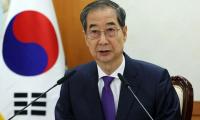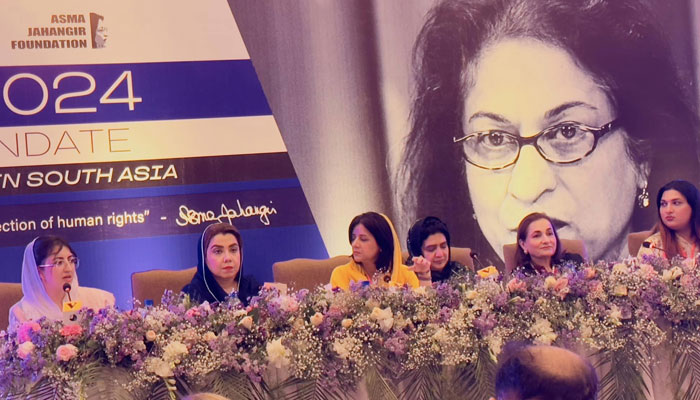Asma Jahangir conference concludes: Speakers urge world govts to take in Afghan refugees
LAHORE: On the second and concluding day of 5th Asma Jahangir conference “People’s Mandate: Safeguarding Civil Rights in South Asia” speakers criticised governments for their lack of decisive action regarding Afghan refugees and emphasised the need for the international community to come together to address the situation in Afghanistan.
Speaking at a session “The Expulsion of Afghans” here on Sunday, the speakers urged governments to fulfill their promises to take in Afghan refugees and not to turn a blind eye to their plight. They emphasised the humanitarian aspect of the issue, stressing that Afghan refugees are victims of war and should be treated as such.
Ahmed Rashid, a Pakistani journalist and author, moderated the session which was addressed by Mahbouba Seraj, rights activist and director of the Afghan Women Skills Development Center, Qaiser Khan Afridi, Spokesperson UNHCR, Pakistan, Fatima Atif, human rights, peace and culture activist from Hazara Community, Christine Chung, Human Rights Officer, OHCHR, Mudassar Javed, CEO of SHARP (Society for Human Rights and Prisoners' Aid) and Patricia Gossman, Associate Director (Asia Division), Human Rights Watch (HRW).
Mahbouba Seraj, who could not physically attend the session, spoke virtually and said that she was so upset when the first set of Afghan refugees was sent back from Pakistan to Afghanistan as she could not believe that a neighbour like Pakistan could do something like that at a time the country was not ready and even the UN was not ready to help these refugees to reestablish themselves in Afghanistan.
While mentioning Gaza, Mahbouba said that we were living in a world that was really a bad place now. “Hundreds of thousands of human beings are going through a miserable time because some governments decide to do what they decide to do,” she added.
Qaiser Khan Afridi said that there was a need to see Afghan refugees through a humanitarian lens and not a political lens as they were the victims of war and not the perpetrators. Appreciating the organisers and speakers, he said in a world where millions of people were displaced due to old and new conflicts and where refugees were labeled as burden and terrorists, there was a need for voices speaking for the rights of refugees across the world.
“We are grateful to Pakistan for supporting Afghan refugees for the last 40 years even though Pakistan is not a signatory to the 1951 Refugee Convention,” Qaiser Afridi said and added the government and people of Pakistan still supported Afghan refugees despite economic and other challenges. “We are appealing to the government to continue to provide this support to Afghan refugees,” he added.
Qaiser Khan Afridi further said that there were different categories of Afghan refugees in Pakistan such as those holding Proof of Registration (POR) and there were 1.3 million of them. While 0.8 million were those holding Afghan citizen cards and were registered in 2017. He added that in 2021, after the developments in Afghanistan, as per Pakistan government’s estimate some 0.6 million more people came to the country. He went on to say that last month the government initiated a plan to ask Afghan refugees and asylum seekers to go back to Afghanistan but UNHCR opposed the plan. He said UNHCR was ready to provide technical and financial support to Pakistan to register these people because these people could not go back as their freedom and lives were at risk in Afghanistan.
Talking about the expulsion of Afghan refugees from Pakistan, Patricia Gossman said that this was not the first time that Afghan refugees were forced to leave as a similar situation was seen in 2016.
Also virtually speaking, Patricia Gossman said that many of the Afghan refugees who were forced to leave were born and raised in Pakistan and had built their lives in the country. She added now these people were being forced to leave Pakistan, to a country which was already in crisis, through a whole range of abuses from detentions to seizing their properties and beatings.
Patricia went on to say that many promises were made in Europe and in the US to take in Afghan refugees particularly after the Taliban takeover but those promises had not been met. She particularly mentioned Germany for its lack of interest and said many Afghan journalists and human rights defenders were at risk as they were still stuck up either in Afghanistan or in Pakistan.
Christine Chung was of the view that Pakistan had human rights law obligations that it had undertaken in the past and when Pakistan would go to Geneva to interact, it would have to answer some very difficult questions about why it has not implemented these obligations in its policy making.
Mudassir Javed said that we really needed to sit with the int'l community on this issue and remind them of their promises as women and children were suffering the most.
-
 Everything You Need To Know About Macron’s Viral Glasses: Cost, Model, All Details Revealed
Everything You Need To Know About Macron’s Viral Glasses: Cost, Model, All Details Revealed -
 Elon Musk Warns Of AI ‘supersonic Tsunami’: What It Means For Future
Elon Musk Warns Of AI ‘supersonic Tsunami’: What It Means For Future -
 Why Victoria Beckham's Dance Video From Brooklyn's Wedding Won't Be Released
Why Victoria Beckham's Dance Video From Brooklyn's Wedding Won't Be Released -
 Prince Harry No Longer Focused On Healing Royal Family Feud?
Prince Harry No Longer Focused On Healing Royal Family Feud? -
 OpenAI Aims To Make AI A Daily Global Tool
OpenAI Aims To Make AI A Daily Global Tool -
 Will Andrew Receive Any Royal Treatment After Title, Royal Lodge Removal?
Will Andrew Receive Any Royal Treatment After Title, Royal Lodge Removal? -
 How Your Body 'suffers' In Back Pain And Simple Way To Fix It
How Your Body 'suffers' In Back Pain And Simple Way To Fix It -
 What Victoria Beckham Really Did At Brooklyn, Nicola’s Wedding Revealed
What Victoria Beckham Really Did At Brooklyn, Nicola’s Wedding Revealed -
 Send Your Name To Moon With Nasa’s Artemis Mission: Here’s How
Send Your Name To Moon With Nasa’s Artemis Mission: Here’s How -
 Zhipu AI, MiniMax Debuts Mask Structural Hurdles For China’s Tech Giants
Zhipu AI, MiniMax Debuts Mask Structural Hurdles For China’s Tech Giants -
 ‘Stargate Community’: Inside OpenAI’s Plan To Cut AI Data Center Energy Costs
‘Stargate Community’: Inside OpenAI’s Plan To Cut AI Data Center Energy Costs -
 Could Brooklyn Beckham Drop His Surname Following Family Feud?
Could Brooklyn Beckham Drop His Surname Following Family Feud? -
 Rachel McAdams Becomes Object Of Jokes At Hollywood Star Of Fame Event
Rachel McAdams Becomes Object Of Jokes At Hollywood Star Of Fame Event -
 South Korea's Ex-PM Han Duck-soo Jailed For 23 Years Over Martial Law Crises
South Korea's Ex-PM Han Duck-soo Jailed For 23 Years Over Martial Law Crises -
 Global Markets On Edge Over Greenland Dispute: Is US Economic Leadership At Risk?
Global Markets On Edge Over Greenland Dispute: Is US Economic Leadership At Risk? -
 King, Queen Visit Deadly Train Crash Site
King, Queen Visit Deadly Train Crash Site




